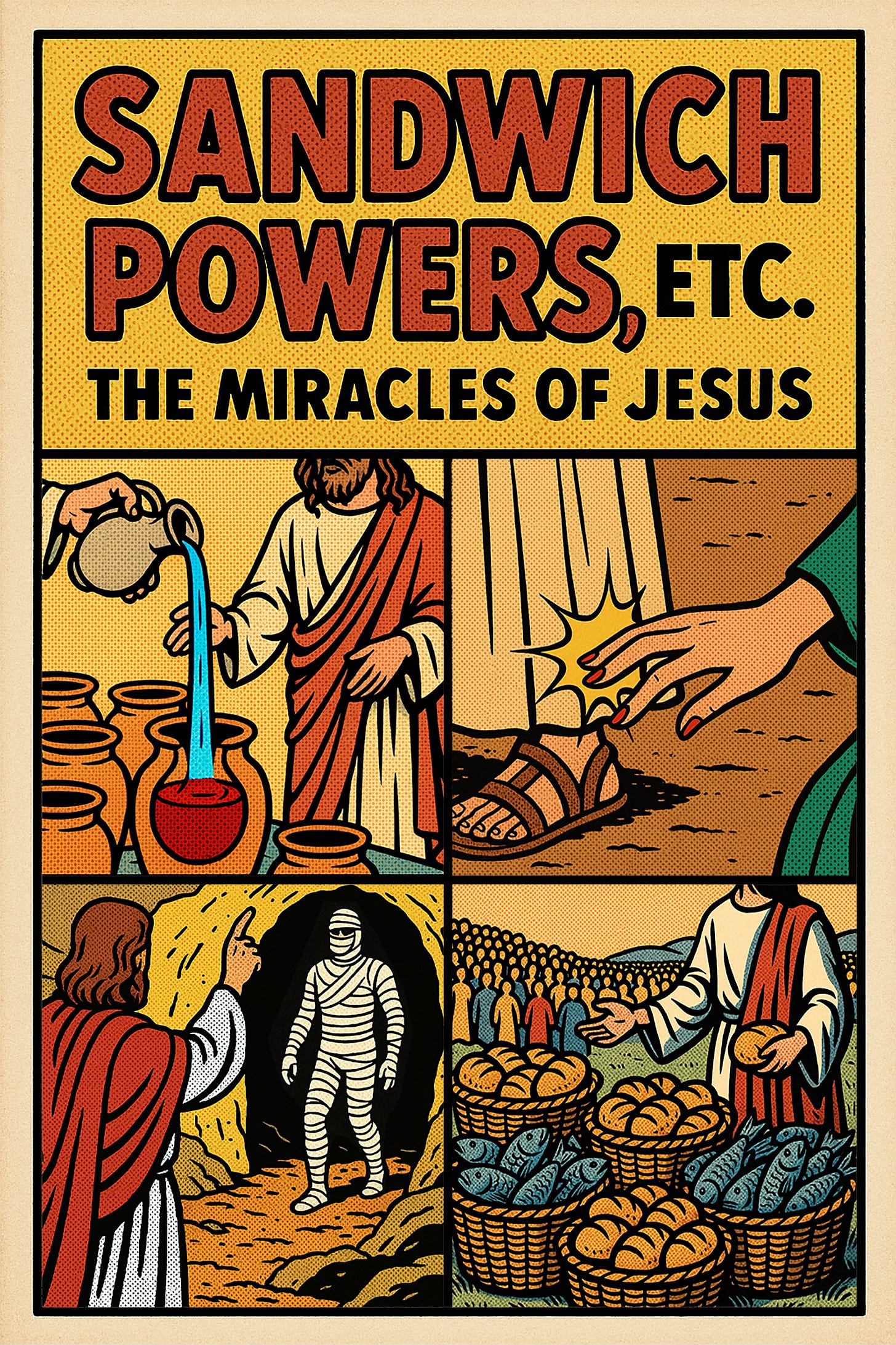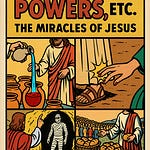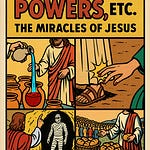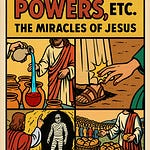Apologies for the technology issues in the recording, and apologies for the livestream not working today too. Nothing is confirmation of the online attendance quite like tech gremlins getting the way!
Luke 5.17-26
My friend Rolf Jacobson is an Old Testament scholar, serving now as the Dead of the Faculty at Luther Seminary in Minnesota. I befriended Rolf almost ten years ago when we both preached at the Festival of Homiletics. Prior to our introduction, I had read Rolf’s work but I had never met him.
I had never before seen Rolf.
Therefore I was surprised to discover he preached from a moveable chair.
“My favorite hymn is “Stand Up, Stand Up for Jesus,” Rolf joked to me and then smiled a broad, shit-eating grin as he watched the discomfort spread across my crimson face.
After he stopped laughing at me, he held his arm out from his wheelchair and offered me his hand.
Later I learned his story.
As Rolf puts it, “The worst part of my life was the six months between October 1981 and March 1982— my junior year in high school.”
When Rolf was sixteen years old, he developed bone cancer. Soon after doctors amputated his right leg, the cancer spread to his lungs. Four painful lung surgeries followed. The operations were accompanied by months of chemotherapy. He was bed-ridden for six months.
“Then came the truly devastating news,” Rolf says.
The cancer that had spread from the bone in his right leg to his lungs had spread from his lungs to the bone in his left leg. After a long course of daily radiation and months spent in a Ronald McDonald House, Rolf says, “All the king’s horses and all the king’s couldn’t put me back together again.” During Lent in 1982, they amputated his second leg. The worst part of his ordeal was that none of his friends visited him. They could not bear to be near his need.
“All in all, I had over twenty surgeries in high school,” Rolf says.
Twenty surgeries and exponentially more medical claims filed.
A preacher’s kid, Rolf Jacobson’s health insurance was provided by the American Lutheran Church and administered by the denomination’s Pension and Benefits Office at which his wife Amy now works as an employee. When Amy started her job, she introduced herself to the matriarch of the staff. Sharing a bit about herself to her new boss, she mentioned that she was married to a pastor-professor named Rolf.
“Rolf Jacobson? Your husband is Rolf Jacobson? He’s alive?!”
Startled, Amy nodded, “Yes.”
Immediately the old woman began to cry.
Finally she explained to Rolf’s wife, “I remember when his first medical claims came across my desk. I paid for his surgeries and his amputations. But then the bills stopped coming. I didn't know if he lived or if he died. I was too afraid to find out. But I always wondered what happened.”
And then, wiping the tears from her eyes and the snot from her nose, she looked up at Amy like she could set down a burden, “Starting with the first claim that came into the office, I prayed for that boy every day of my life for three years without ceasing. The LORD probably thinks of me as that annoying widow at the door in his parable.”
Amy thanked her.
And the woman replied, “There was one other child, a boy like Rolf. I prayed for him every day too.”
Every day.
For three years.
Every day.
For over a thousand days.
Every day a middle-aged Claims Specialist in the Twin Cities strapped a boy named Rolf Jacobson— she didn’t even know him— down onto a mat and she carried him to Jesus.
And the boy lived!
Here is my question.
It is one of the most important questions.
Did her prayers work?
Or rather, did her faith work?
That is, did the LORD work a miracle for Rolf because that woman carried him to Jesus in prayer and Jesus saw her faith? Is Rolf in a chair instead of a coffin because of an anonymous Claims Specialist? Would Christ not have saved him apart from her intercessions?
Before you venture an answer to the question, consider an ostensibly different question.
In his final parable before his Passion, Jesus compares the incursion of the Kingdom of God to a shepherd separating his sheep from the goats. The shepherd will place the sheep at his right hand and the goats opposite.
The distinction that divides them?
“I was in prison and you visited me.”
“I was in prison and you did not visit me.”
Our stale familiarity with the parable blunts our capacity to comprehend its mystery. After all, eleven chapters prior to this final parable of judgment, the Gospel of Matthew reports that Herod has arrested and jailed John the Prophet for accusing the king of stealing his brother’s wife.
While John the Baptist languishes in prison, John’s disciples come to Jesus, saying “The prophet wants us to ask you, are you the one or should we look for another?”
And Jesus replies with his highlight reel of miracles worked. But when John’s disciples return to John, Jesus does not go with them. John the Baptist was in prison and Jesus did not visit him.
Does Jesus not practice what he preaches? Does Jesus judge according to a command he himself does not keep? Is the Good Shepherd really a goat?
John was in prison and Jesus did not visit him.
Why?
In the Gospel of Mark, the miracle for the man on the mat is the first mention of faith; meanwhile, in Luke, Jesus has just escaped the lynch mob his maiden sermon provoked in Nazareth. The angry crowd had attempted to hurl the LORD off a cliff. Now a crowd of spectacle-seekers from all over Judea has converged upon the house of Peter’s mother-in-law.
Like Lazarus whom Jesus summons from the tomb, we know nothing about the man on the mat other than his malady. Matthew, Mark, and Luke do not explain his predicament. They report only that while he does not have the use of his legs, he does have four friends.
From somewhere in Judea, they have carried him.
Somehow they have faith.
Somehow they have faith that Christ can cure the friend they carry to him.
When they arrive at the house in Capernaum, “their shoulders numb, the ache and stoop deeplocked in their backs, the stretcher handles slippery with sweat,” the crowd refuses to yield to their need. So the four of them strap their friend tight to the stretcher. They make him tiltable. And having carried him all the way to Capernaum— Judea is over two million acres big, they lift him first over the crowd and then up to the rooftop of the house.
Just as at his baptism in the Jordan when the Father tore open the sky and the Holy Spirit descended upon the Son, the four stretcher bearers tear open the roof of the house and lower their friend, like a dove, down to Jesus. In Mark’s account of the miracle, the friends dig up the thatched roof; they literally “unroofed the roof.” Luke reports instead that they did not dig up the roof but removed the tiles from its crossbeams. In either case— whichever way— they determine to crash into Christ’s presence with their friend who needs Jesus.
Notice, Luke introduces their act home invasion with a little word that is auspicious in the scriptures, “Idou!”
“Behold!”
As in…
“Behold, the Lamb of God who takes away the sins of the world!” John the Baptist announces, pointing to Jesus.
“If any one is in Christ,” Paul writes to the Corinthians, "new creation! The old has passed away, behold, the new has come.”
“And Abraham lifted up his downcast eyes,” the Book of Genesis narrates, “Abraham looked, and behold! Behind him was a ram, caught in a thicket by his horns.”
As Fleming Rutledge writes:
“When the word translated “behold” appears in the Old and New Testaments, it does not simply mean “see!” or “look!,” contra recent translations. It denotes a powerful revelation— an unveiling— of the LORD Jesus Christ.”
“And behold,” Luke writes, “some men were bringing on a bed a man who was paralyzed.”
Behold.
Something besides the roof is being opened up before you and me.
In his book God Meets Us in Our Suffering, Rolf Jacobson recalls long regimen of radiation in the interim before he lost his last leg.
He writes:
“During radiation treatments, I stayed at the Ronald McDonald House. My dad or mom was always with me. One day, my dad said, “Jerry Larson is coming down today and taking us to dinner.” I didn’t feel up to it and told him to go without me. But Jerry was a force of nature.
He was a traveling paper salesman with a radiant, oversized personality—bald on top, always flushed red, and constantly grinning. He bargained with his barber for half-price haircuts and radiated joy wherever he went. When Jerry insisted on something, resistance was futile.
So I found myself in the back seat of Jerry’s sedan, carried sideways in the car because the tumor in my leg prevented me from bending my knee. My leg ached dully. My mood ached worse. I silently vowed to endure dinner and complain later. Jerry drove us north to the Fisherman’s Inn, a Minnesota supper club. I don’t remember the menu, but I’ll never forget the scene. Our waitress brought drinks and asked if we had any questions.
Jerry pounced.
“How are your ribs?” he asked. “No, really—how are your ribs? If your favorite uncle came to town, the one who did everything for you when you were little, would you serve him these ribs?”
The waitress, caught in Jerry’s infectious spirit, replied, “I would insist he have our ribs!”
“We’re all having ribs!” Jerry proclaimed.
And we did. They were just what an emaciated cancer-stricken teenager needed. The laughter, the food, the joy—it all turned something over inside me. I’d been stewing in pain and bitterness. That night, I tasted grace.
Before dinner, I was trapped in the grind of cancer and isolation. But Jerry’s faithfulness made it the best moment in the worst part of my life. I’m nearly eternally grateful to Jerry—which is to say, I’m grateful to God—for it. Jerry was Christ to me.”
Jerry was Jesus to Rolf.
He did not mean that as a metaphor.
And since he did not mean that as a metaphor, the claim is put better— we hear it more clearly— the other way around, “Jesus was Jerry to Rolf.”
Jesus was Jerry to Rolf.
“Behold,” God says to the prophet Jeremiah, “I am the LORD of all flesh: is there any thing too hard for me?"
If Jesus summons us to visit the prisoners, then why do the Gospels not report Jesus visiting John the Baptist in jail?
Jesus does not go visit John in prison because Jesus is already with John in prison.
It’s right there in the parable, “What you do to the least of these, you do it to me.”
We hear his final parable as a sobering summons to action when really— read it again— Jesus uses the parable to reveal to us the mystery that he can be in many places at once: with the hungry and at the same time with the thirsty, with the stranger yet simultaneously with the naked, with the sick but also in prison.
Unlike John in jail, Jesus is not confined to the location he occupies.
He is not trapped in the room where he is present. He is not bound by space. He is contained in multitudes.
He is with John in jail even as John’s disciples alert him to the Baptizer’s arrest. He is on the heavenly throne even as he is in Mary’s womb.
While he is teaching in a crowded house in Capernaum, he is simultaneously wherever two or three or four are gathered to bear their friend on a mat to a miracle.
There is not anything that is too hard for him!
The scribes and the Pharisees rage in their hearts at Jesus for doing what only God can do, pardoning the man of all his sins. In Matthew’s account, the crowd walks away from this miracle in awe, astounded that God had given such authority and power to a human being. The scribes and the Pharisees make the same mistake as the crowd. But we commit the very same error when we suppose that Jesus is confined to a single space he occupies.
He’s not.
As Robert Jenson writes:
“The Christian God is not so transparent to knowledge as to harbor no surprises.”
Jesus is not trapped in the room where he resides.
Multitudes contain him.
That this is a deep mystery does not negate the fact that it is the straightforward teaching of the scriptures.
The author of the Book of Hebrews proclaims that “Faith is the assurance of things hoped for, the conviction of things not seen.” But the word translated into English as assurance is the word hypostasis, the Greek word for person— the same word the creed uses to describe the Son’s relation to the Father and their relation to the Spirit.
Faith is now the presence of the person for whom we hope.
Two chapters later, the Book of Hebrews says that “Jesus Christ is the same yesterday, today, and forever.” But that affirmation about Christ comes in the context of an exhortation about faith. Thus Jesus Christ is constant across time because at all times he is present as faith; he is present in faith.
Jesus Christ the same yesterday, today, and forever means that wherever you see faith happening, that is Jesus’ life taking shape in the world.
Whether he’s ascended on the throne or wrapped in swaddling clothes in the manger, Jesus is not limited to his location.
Again, this just is the teaching of the scriptures.
In the Epistle to the Romans, the apostle Paul declares, “For I am not ashamed of the gospel…For in it the righteousness of God is revealed from faith to faith.” The Book of Hebrews echoes this thesis when it refers to Jesus as “the Pioneer and Perfector of our faith.”
From faithfulness to faithfulness.
Pioneer to Perfection.
In other words:
From the Beginning to the End.
From First to Last.
Alpha and Omega.
These are three of Christ’s names.
And Faith is another one!
Faith is a name for Jesus.
When Paul speaks of faith, he’s talking about Jesus. He’s pointing to Christ happening in him.
This is why Paul appeals to the Corinthians by writing:
"If the dead are not raised, not even Christ has been raised. And if Christ has not been raised, your faith is useless.”
The claim is right there in the logic chain.
Faith depends upon Jesus not being dead because if Jesus is not living then he is not available to be alive in your faith.
And if he is not living in your faith, then…why bother?
Faith is neither an innate attribute nor an acquired skill. Faith is a synonym. Faith is a synonym for the energy and the activity of Jesus happening in and at work through you.
Paul says this explicitly in the Letter to the Galatians:
“It is no longer I who live, but Christ who lives in me. The life I now live in the body I live by the faith of the Son of God, who loved me and gave himself for me.”
And then in the very next chapter Paul makes faith the subject of verbs.
Notice how Paul uses faith and Christ as interchangeable terms:
“Now before faith came, we were held captive under the law, imprisoned until…faith would be revealed. So then, the law was our guardian until Christ came…But now that faith has come, we are no longer under a guardian.
Faith is just another name for Jesus.
If you don’t turn your head from it and shrink from the mystery, the claim is clear. According to Paul, faith is Jesus (who is not dead) dwelling in you.
You do not “have” faith, as though it were your possession.
Faith is at work in you, as Jesus; faith is Jesus possessing you.
Faith is Christ’s compassion— his desire and love, his mercy and gentleness, both his grace and his righteous unrest— alive in you. “If Christ is in you,” Paul proclaims, “the Spirit will be your life because of Jesus.”
Jesus did not go to visit John because Jesus was already present with John.
As faith.
The same faith that moved a Claims Specialist to pray for an anonymous boy.
Thus far, Rolf has not once picked up his wheelchair and walked home. But he did survive to become a take-no-prisoners player of Settlers of Catan. And he plays guitar in a bluegrass band called the Fleshpots of Egypt.
Recollecting his final amputation, Rolf writes:
“Despite months of effort, the Mayo team couldn’t save the leg…On March 13, 1982, they amputated it…The last thing I remember of that day was lying on a gurney, waiting to be wheeled into surgery, visiting with a fellow who was also awaiting surgery. When they came to get me, he said, “May God bless you.”
The man walking beside the bed just was the blessing of God.
No.
The man walking beside the bed with a blessing in his mouth was God.
That was Jesus.
Behold!
When the friends of the man on the mat tear open the roof of the crowded house and crash into Christ’s presence— when Jesus sees their faith, according to the scriptures Jesus is doing nothing short of looking at himself.
He is in the room.
And he is on the roof.
Jesus is not just where you can see him.
He is in the faith of the friends of the man on the mat.
They have broken into the house like the Wet Bandits and crashed through the roof into Christ’s presence not simply because they wanted their friend there but because Jesus wanted him there.
Just so—
That Claims Specialist in St. Paul was not simply praying for Rolf.
She was the Providence of God for Rolf.
Faith is not how we persuade God to act.
Faith is how Christ acts in and through us to be the providence of God.
Notice:
Before the man on the mat is forgiven, Jesus calls this sinner “Friend.”
God calls him “friend” before God forgives him! And God heals this friend without a single mention of him having any faith. Matthew, Mark, and Luke say nothing about the man on the mat having faith. The ones who bear him to Jesus have faith.
Hear the good news:
Faith has nothing to do with God befriending you.
Faith has nothing to do with God forgiving you.
Faith has nothing to do with God working a miracle for you.
Your faith has nothing to do with you!
Faith is not what you offer so that God will do good for you. Faith is the LORD Jesus in you— Jesus at work in you— wanting to do God's will for the people around you who are suffering, for the people around you who are forsaken, for the people around you who are grieving, for the people around you who need Jesus.
Faith is Jesus at work on you so that you will bear another’s burden. Faith is Jesus alive upon you so that you will speak with a blessing on your mouth to a boy in need. Faith is Jesus in you so that you will carry someone to God.
The fact is:
You don’t need faith to be a friend of Jesus.
You don’t need faith to be forgiven all your sins.
You don’t need faith to be healed.
And you certainly don’t need faith to receive a miracle.
It’s sin that makes us think that God is so transactional.
It’s sin that makes us think our compassion is not first God’s compassion.
It’s sin that makes us think we must persuade God to act according to love.
And it’s the devil who speaks in if/then conditions.
On the one hand, it’s a terrible business model for the church.
Yet it’s the gospel truth.
You don’t need faith for God to call you friend.
You don’t need faith for pardon.
And you don’t need it for him to grant you a miracle.
But!
But you do need faith to cooperate with Jesus.
You do need faith to participate in what he is up to in the world. You do need faith to cooperate with the healing God in bringing the sick to him.
Therefore, come to the table.
For that reason, come to the table.
Come to the table— take and eat; become the providence of God.
Taste and see that he will never leave you once he indwells you.
It’s only a sip and a swallow but it’s enough.
It’s enough for you to be Jesus for someone.
Come to the table.
Jesus is not just where you can see him.
Come to the table, where like recognizes like.















Share this post